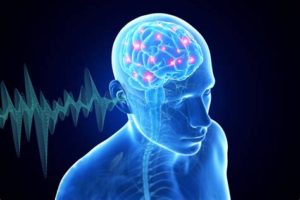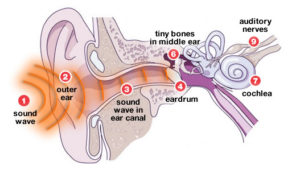Hearing with our Brain: The Link Between Hearing Loss and Cognition
Did you know, hearing happens with our brains, not our ears!
It’s true! Although it is the ears take in the noise around us, it’s our brain that makes sense of it and tells us it’s sound.
As our ears take in noise it moves through the outer, middle, and inner ear. This noise converts into electrical signals in the auditory nerve. After it is converted, the signal travels to our brain where it is interpreted as sound. This complicated process happens within milliseconds; amazing!
Hearing loss is often the result of damage somewhere in the ear or the auditory nerve. When auditory signals either can’t reach the brain or are too weak to pick up, the brain begins to forget these sounds. This is one reason why it may take a few weeks to get used to wearing new hearing aids. You are essentially re-teaching your brain to recognize those sounds again.
Hearing Loss and Cognition
In older adults, the parts of the brain that are inactive begin to lose their ability or forget how to function. Several studies from Johns Hopkins University¹ found that hearing loss and accelerated cognitive decline are connected. This is due to areas of the brain experiencing decreased activation from the ears. This increases the cognitive load (energy needed to perform a task) on other parts of the brain. Although hearing loss is only one factor, the connection suggests that hearing loss can increase the likelihood of cognitive decline; including conditions like Alzheimer’s or Dementia. Meaning, these conditions are not just an age-related issue. In addition, hearing loss can contribute to social isolation, decreased activity, and depression. As a result, all suggest an increased risk of developing these cognitive conditions. For more information check out this video.
Please understand, there is just a possibility of increased risk. It does not mean that everyone with hearing loss will develop Alzheimer’s. It is important to understand that there are things you can do to decrease the risk or even prevent further cognitive decline in yourself or your loved ones.
Treatment
According to research, one of the best interventions to prevent and even potentially reverse early signs of Alzheimer’s or Dementia is the use of hearing aids! Hearing aids provide the sound stimulation needed to restore areas of the brain. This occurs by activating those areas again or creating new pathways that can process the incoming information.
For adults 40-65 it is encouraged to get your hearing tested at the earliest signs of hearing difficulty. Consequently, as with most health-related issues, the earlier intervention happens, the better the outcome. For those already diagnosed with Alzheimer’s or Dementia, while you may not be able to stop the progression, intervention through hearing aids has the potential of slowing it down. The added benefits include being able to hear and engage with those around you with more confidence, comfort, and clarity. Because we technically hear with our brain, we want to ensure the brain is getting all the signals it needs, the sooner the better, in the case of hearing.
Now what?
We are only beginning to understand how the brain works and the factors that affect it. As more and more research is done and knowledge is collected, new technology and techniques are being developed to help us live happier and healthier lives.
We understand that this topic may cause some discomfort, stress, or even fear when considering how it may affect ourselves or our loved ones. Yet, being informed and understanding what you can do to reduce or prevent cognitive decline may also help reduce that fear and stress associated with it.
If you have concerns, don’t put it off. Have your hearing tested annually and if there is a loss take it seriously and treat it. For more information or if you have questions, please feel free to connect with us. We would be more than happy to help.
More Information
Furthermore, if you would like to read further into the Johns Hopkins research, please see the links below.
Lin, F. R., & Albert, M. (2014, May). Hearing Loss and Dementia – who is listening? Aging & Mental Health, 18(6), 671-673. DOI:10.1080/13607863.2014.915924
Lin, F. R., Yaffe, K., & Xia, J. (2013). Hearing Loss and Cognitive Decline in Older Adults. JAMA Intern Med, 173(4), 293-299. DOI:10.1001/jamainternmed.2013.1868




Recent Comments